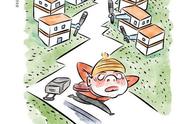动词用法辨析

(1) be used for、be used to、used to、get used to的区别:
be used for 名词/代词或动名词, be used to 动词原形,表示两个短语意思相近,表示“用于…”。
used to 动词原形,表示“过去常常”,否定式可以是“didn’t use to”也可以是“usedn’t to”;
get/be used to 动名词,表示“习惯于….”。
如:A knife can be used for cutting things.(刀可以用来割东西)
A knife can be used to cut things.(刀可以用来割东西)
He used to borrow novels from the library when he was at school. (他上学时常常在图书馆借书)
He is used to getting up early in the morning. (他习惯早起)
(2) beat, win与lose的区别:
beat (打败),后面跟“人”,
win(赢得),后面跟“比赛、竞赛”等。
如:Who won at last? (最后谁赢了?)
Class Three beat us 5-0. (三班以5∶0打败了我们)
I am sure to win the match. (我一定能赢得比赛)
lose则表示“输了”,常用句型:lose sth. to sb.
如:Unluckily we lost the match to Class Three. (不幸的是我们比赛输给了三班)
(3) grow、plant、keep的区别:
plant着重讲“栽、种植”这个动作,
grow则指种植以后的“栽培”、“管理”
keep则主要指“喂养”、“赡养”一个人或者动物。
如 :He grew vegetables in his garden. (他在园子里种菜)
I planted ten trees last year, but four of them died. (去年我栽了10棵树,但是死了4棵)
Old women enjoy keeping cats or dogs to kill the time. (老年的妇女喜欢养猫养狗打发时间)
(4) fall 、drop的区别:
fall指东西由高处向下坠落,不及物动词;也可以作连系动词,意思是“变得,进入某种状态”。
drop表示物体由高处往低处落下,不及物动词;或让物体落向低处,及物动词。
如:The man fell off the tractor and hurt himself. (那个人从拖拉机上摔下来跌伤了)
Soon after they touched the pillows they fell (系动词) fast asleep. (他们头挨枕头不久就睡着了)
He felt as if he had to drop maths.(他觉得似乎要放弃数学)
He dropped a letter into the mail-box.(他向邮箱里丢了一封信)
(5) join、join in、take part in的区别:
join多指参加组织、团体、党派等,后面跟人时表示和某人一起参加某项活动;
join in指参加某项游戏或活动;
take part in多指参加群众性的活动、运动、会议等。
如:He joined the army in 2001.(他2001年参军)
They joined me in congratulating you.(他们和我一起向你祝贺)
Do join us in the game.(千万参加我们的比赛)
He took an active part in the students’ movement in the 1940s.
(在二十世纪40年代他积极参加学生运动)
(6) beat、hit、strike的用法区别:
beat指“连续不断地打击;(心脏的)跳动”;
hit指“一次性地撞击、命中”;
strike与hit基本同义,还可以理解为“划(火柴)、给……深刻的印象”。
如:The man looks dead, but his heart is still beating weakly. (那个人看上去死了可心脏还在微弱地跳动)
He hit the ball so hard that it flew over their heads and fell into the lake.
(他踢球的劲太大,球飞过他们的头顶落入水中)
He went into the room and struck a match(火柴). (他走进房间划着了一根火柴)
(7) carry on、carry out的区别:
carry on表示“进行、继续”;
carry out表示“进行、贯彻、实现”。
如:I will carry on the work. (我会继续工作)
I have some difficulties in carrying out his orders. (对于执行他的命令我有问题)
(8) be amazed与be surprised的区别:
be amazed“感到惊讶”,指人对某个不可能发生却实际发生了的事情感到极其的讶异;
be surprised“感到吃惊”指人对突发的事件感到惊讶。
如:When he dived deep into the sea, he was amazed at the colours of all the beautiful coral reefs.
(他深潜到海中时被所有美丽的珊瑚礁惊呆了)
He was very surprised when he heard a loud noise from inside the room.
(听到房间里传出一个很大的声音他非常地吃惊)
(9) warn的用法:
“warn sb. of/about sth”意思是“针对…而警告某人”;
“warn sb (not) to do sth”意思是“告戒某人(不)要做某事”;
“warn sb. that从句”意思是“警告某人说……”。
如:They warned the passengers of thieves. (他警告路人小心窃贼)
I warn you that you will fail in the coming exams if you are still so lazy.
(我警告你:如果你还这么懒在即将来到的考试中你会不及格的。)
He was warned not to go out in the late night. (他受到警告不要在深夜出去)
(10) think of与think about等短语的区别:
think of表示“考虑、思念、认为、想起、建议”等;
“think about”表示“看待、认为”;
“think much /highly /a lot of”表示“高度评价…”;
“think over”表示“仔细考虑”;
“think out”表示“想出”。
如:The headmaster thought highly of this boy. (校长高度地评价了这个男孩)
We’re thinking of going to France for our holiday. (我们在考虑去法国度假的事情)
Think it over and you will have a way. (仔细考虑就有办法)
I cannot think of his name. I forgot it. (我想不起他的名字我忘了)
-What do you think about his composition? -Very good! (他的作文你觉得怎么样? 很好。)
(11) agree with/ agree to / agree on等词语用法:
“agree to 动词”表示“同意做某事”,
“agree with sb./观点”表示“赞同…的观点”
agree about表示“对…话题有相同看法”
“agree to 建议”表示“同意”某人的建议,
“agree on 决定”表示“赞成某人的决定”。
(12) deserve(应该,应得)的用法:
deserve后面可以加不定式,也可以加名词。
如:They had tried their best and they deserved to win. (他们尽力了该赢。)
The little boy always made troubles around and deserved beating. (小男孩总是处处惹麻烦活该被打)
The girl did a good deed and deserved praise. (女孩做了好事应该受到表扬)














